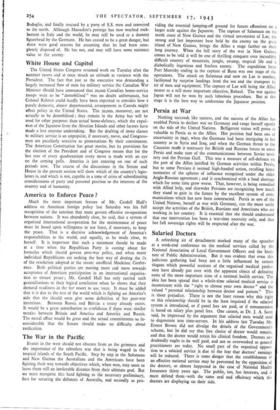Salaried Doctors
A refreshing air of detachment marked many of the speeches at a week-end conference on the medical services called by the National Association of Local Government Officers and the Insti- tute of Public Administration. But it was evident that even this judicious gathering had been not a little influenced by certain slogans which powerful sections of the organised medical profes-
sion have already put over with the apparent object of defeating some of the more important aims of a national health service. The idea has been spread that a whole-time salaried medical service is inconsistent with the " right to choose your own doctor " and the valued " personal relationship between doctor and patient" This is sheer prejudice. There is not the least reason why this light or this relationship should be in the least impaired if the salaried system is introduced, or if panel fees are paid, or if remuneration is based on salary plus panel fees. One cannot, as Dr. J. A. Scott said, be impressed by the argument that salaried men would tend to degenerate into time-servers. In his address last Tuesday Mr. Ernest Brown did not divulge the details of the Government's scheme, but he did say that free choice of doctor would remain, and that the doctor would retain his clinical freedom. Doctors un- doubtedly ought to be well paid, and not so overworked as general practitioners are today. No small part of the organised opposi- tion to a salaried service is due to the fear that doctors' earnings will be reduced. There is some danger that the establishment of an effective national service may be prevented by the opposition of the doctors, -as almost happened in the case of National Health Insurance thirty years ago. The public, too, has interests, and it must defend them •with the same zeal and 'efficiency which the doctors are displaying on their side.


























 Previous page
Previous page